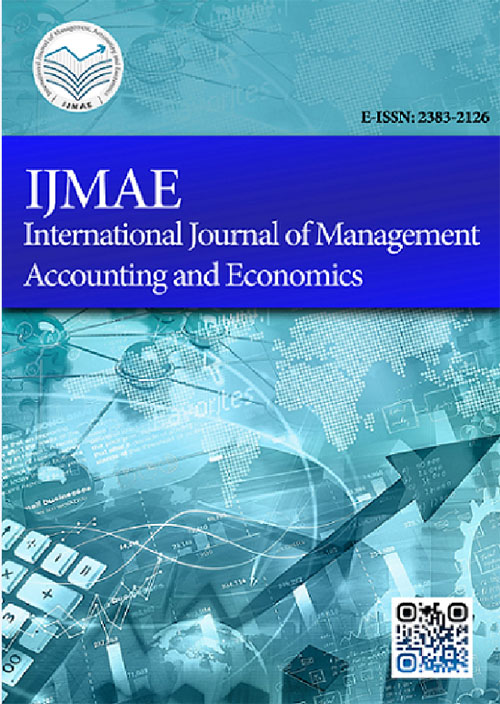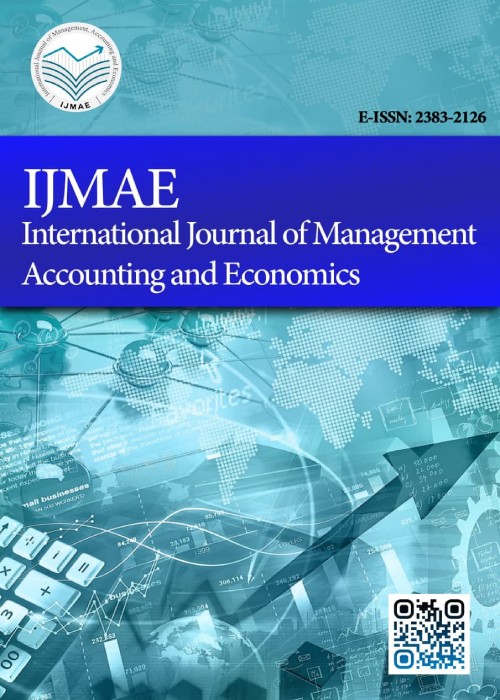فهرست مطالب

International Journal of Management, Accounting and Economics
Volume:8 Issue: 7, Jul 2021
- تاریخ انتشار: 1400/06/10
- تعداد عناوین: 4
-
Pages 483-498This paper examines the impact of COVID-19 lockdown on daily stock returns of banks and financial institutions (BFI) in Nepal. Employing the panel data regression models, this study examines the effect of daily COVID-19 positive cases to the stock returns – during pre-lockdown, lockdown, and after-lockdown period – of 74 listed firms in Nepal from 2 May 2019 to 25 April 2021. The empirical results confirm that there was no significant impact of daily increased number of COVID-19 positive cases to the stock returns of BFIs in Nepal throughout the entire study period. Furthermore, this study inquires the influence of pandemic period to the individual class of the BFIs sector in NEPSE[1]. It discloses that the commercial banks, development banks and microfinance companies’ stock returns were adversely impacted during the pre-lockdown and lockdown period. However, after-lockdown period had significantly rebounded the overall BFIs stock returns in Nepal with the highest returns earned by microfinance companies and lowest return by commercial banks. [1] Nepal Stock Exchange LimitedKeywords: COVID-19, Pandemic, NEPSE, Stock Returns, Nepal
-
Pages 499-516Financial development has recently been captured the attention of researchers as in important element of economic prosperity. As foreign direct investment can have an important role in the economic achievements, this study investigates the role of financial development in attracting FDIs. Unlike earlier studies, it considers the most comprehensive proxy of financial development which overcomes the shortcomings due to ignorance of many economic components by earlier researchers. In this connection, this study uses panel of 39 countries from One Belt One Road (OBOR) economies. The empirical findings provide evidence in favor of financial sector reforms so as to benefit from foreign investment. The results are robust to the alternative measures of financial deepening under instrumental variable estimation. Therefore, the research specifically suggests countries to concentrate on developing their financial systems. Proper policy formulation can be done to reconstruct the weaker systems and to ensure wider and safer public access to the financial systems.Keywords: Financial Deepening, FDI, OBOR
-
Pages 517-528The purpose of this study is to investigate the effect of corporate governance mechanisms on the relationship between related party transactions and audit fees. In this study, board size and duality role of CEO were selected as corporate governance mechanisms and their effect on the relationship between related party transactions and audit fees among 93 companies listed on the Tehran Stock Exchange in the 10-year period of 2011-2020 were investigated. For this purpose, three hypotheses were formulated to investigate this issue and research regression models were tested using the panel data method with the fixed effects approach. The results showed that there is a positive and significant relationship between related party transactions and audit fees. The results also indicate that corporate governance mechanisms (board size, CEO duality) have a negative and significant effect on the relationship between related party transactions and audit fees. In fact, the results indicate that auditors are increasing their audit efforts (reflecting audit fees) to address the risk associated with related party transactions. It also minimizes conflicts of interest, opportunistic behaviors of managers and, consequently, the risk associated with related party transactions by applying appropriate regulatory mechanisms.Keywords: related party transactions, Audit fees, Corporate Governance
-
Pages 529-541The public sector should be equipped with new communication technologies such as social media to improve the quality of services. Social media as a new channel of government services leads to the emergence of E-government 2.0 and the realization of E-democracy. Meanwhile, identifying the beneficiaries and users of the above-mentioned technology, as well as the variety of services which can be provided is highly significant. The present study aimed to explain the concept of E-government 2.0 and identify users and a variety of services that can be provided on social media in developing countries by focusing on information and communication technology offices. Therefore, the mixed research method was used to achieve the research objective. In the qualitative phase, library surveys and semi-structured interviews were used while and in the quantitative phase, the researcher-made questionnaire was used as a data collection tool. The results indicated that E-government 2.0 users are divided into two general groups of internal and external users while E-government 2.0 services are divided into five general categories including information services, financial-operational services, crisis management services, data services, and customized services. Conducting such a study was considered significant since E-government 2.0 literature paid less attention to the diversity of services and types of users. Using the results obtained from the study, it can be expected that managers and government sectors can plan and decide how to provide services to different groups of users. The result is the increased quality of services and the realization of e-democracy.Keywords: E-government2.0, Users, services, communication style, Social Media


